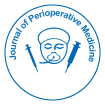
Journal of Perioperative Medicine
Open Access
ISSN: 2684-1290

ISSN: 2684-1290
Commentary - (2023)Volume 6, Issue 3
Perioperative medicine has emerged as a rapidly evolving field of medicine that aims to optimize patient care before, during, and after surgical procedures. The goal of perioperative medicine is to improve patient outcomes by reducing the risks associated with surgery and enhancing the recovery process. One way to achieve this goal is by implementing perioperative medicine protocols, which can help healthcare providers, streamline patient care and improve outcomes.
Perioperative medicine protocols begin with a comprehensive preoperative assessment, which is essential for identifying patient-specific risk factors that could increase the likelihood of complications during surgery. These assessments include a thorough review of the patient's medical history, current medications, and any chronic medical conditions. Patients are evaluated for potential respiratory, cardiovascular, and metabolic risks that may require special attention during surgery.
By identifying and addressing these risks before surgery, perioperative medicine protocols can help reduce the likelihood of postoperative complications and improve patient outcomes. Preoperative assessments also allow healthcare providers to develop personalized care plans tailored to individual patient needs.
Optimizing chronic medical conditions before surgery is a critical aspect of perioperative medicine protocols. Patients with chronic medical conditions, such as diabetes, hypertension, or heart disease, require careful management to ensure the best possible outcomes after surgery.
Perioperative medicine protocols may include interventions such as lifestyle modifications, medication adjustments, and monitoring of key physiological parameters to help manage chronic medical conditions. These protocols can help reduce the risk of complications during and after surgery, improve wound healing, and enhance overall patient recovery.
Enhanced Recovery After Surgery (ERAS) protocols are another important aspect of perioperative medicine that can help improve patient outcomes. ERAS protocols are a multidisciplinary approach to patient care that combines preoperative counseling, pain management, nutrition optimization, and physical therapy.
ERAS protocols can reduce the length of hospital stays, improve functional recovery, and reduce the risk of complications such as infections. By optimizing care before, during, and after surgery, ERAS protocols can help patients recover faster and return to their normal activities sooner.
Effective pain management is critical to successful surgery and patient recovery. Perioperative medicine protocols aim to minimize pain and discomfort after surgery using a combination of medications, nerve blocks, and other pain management techniques.
By minimizing the use of opioids, perioperative medicine protocols can reduce the risk of opioid dependency and addiction. Perioperative medicine protocols can also improve pain management by incorporating strategies such as regional anesthesia, non-opioid medications, and psychological interventions.
Perioperative medicine protocols can help reduce the length of hospital stays by improving patient recovery times. This can result in significant cost savings and better patient outcomes. By reducing the length of hospital stays, patients are able to return home sooner, which can improve overall patient satisfaction.
Patient education is another critical aspect of perioperative medicine protocols. Providing patients with information about their surgery, what to expect during and after the procedure, and how to manage their recovery can improve patient engagement and lead to better outcomes.
Perioperative medicine protocols can help ensure that patients receive the information they need to feel confident and prepared for their surgery. By empowering patients to participate in their care, perioperative medicine protocols can help improve patient satisfaction and overall outcomes.
Perioperative medicine protocols are an essential component of modern healthcare, helping to improve patient outcomes by reducing the risks associated with surgery and enhancing the recovery process. By implementing perioperative medicine protocols, healthcare providers can streamline patient care, improve recovery times, and reduce the length of hospital stays.
Citation: Ludbrook G (2023) Implementing Perioperative Medicine Protocols: A Path to Better Patient Outcomes. J Perioper Med. 6:167.
Received: 02-May-2023, Manuscript No. JPME-23-24132; Editor assigned: 04-May-2023, Pre QC No. JPME-23-24132 (PQ); Reviewed: 18-May-2023, QC No. JPME-23-24132; Revised: 25-May-2023, Manuscript No. JPME-23-24132 (R); Published: 01-Jun-2023 , DOI: 10.35248/2684-1290.23.6.167
Copyright: © 2023 Ludbrook G. This is an open-access article distributed under the terms of the Creative Commons Attribution License, which permits unrestricted use, distribution, and reproduction in any medium, provided the original author and source are credited.